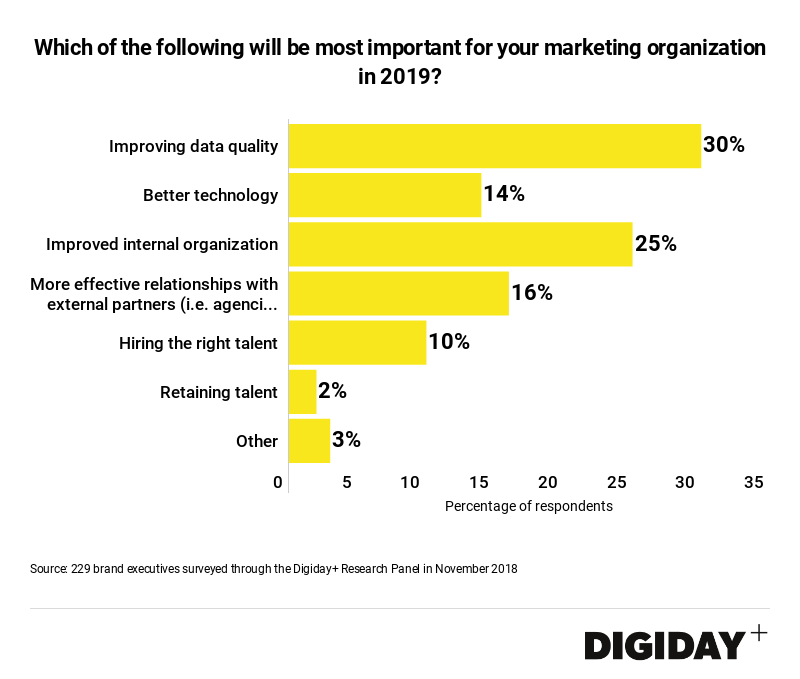Secure your place at the Digiday Publishing Summit in Vail, March 23-25
Digiday Research: Improving data quality is the top goal for marketers in 2019
This research is based on unique data collected from our proprietary audience of publisher, agency, brand and tech insiders. It’s available to Digiday+ members. More from the series →
First-party is now more valuable than ever, as online giants Amazon, Facebook and Google have demonstrated in recent years. As a result, marketers now say improving the quality of their data and their data collection practices is now a key priority for 2019.
In a survey of 229 brand marketers by Digiday this November, 30 percent of respondents said improving their data quality will be their organization’s top marketing goal for 2019, ahead of other initiatives such as improving their technology and hiring and retaining talent.
Improving internal structures and efficiencies is also top of marketers’ minds, according to 25 percent of the respondents.
Marketers looking to enhance the value of their data are increasingly placing emphasis on quality over quantity, and focusing on their own first-party data instead of that offered by third parties. 82 percent of marketers now believe third-party data to be unreliable, according to earlier Digiday research.
Marketers looking to enhance the value of their data are increasingly placing emphasis on quality over quantity, and focusing on their own first-party data instead of that offered by third parties. 82 percent of marketers now believe third-party data to be unreliable, according to earlier Digiday research. Marketers report that ad-targeting data from third parties can often fail to accurately identify simple data points such as gender, for example.

Improving data quality is not just important to marketers because for audience targeting and campaign performance reasons. Scalable, high-quality data is becoming a prerequisite for those looking to power artificial intelligence or machine learning-based decision-making. Low-quality data risks misinforming business strategies and decisions.
Meanwhile, as more companies look to take their marketing efforts in-house, advertisers are being forced to reconsider how they structure their internal marketing teams. Rapidly building in-house marketing teams poses organizational challenges for advertisers as employees navigate new and varying responsibilities. As a result, companies such as Marriott have begun to favor hybrid models where newly organized internal teams own media-buying responsibilities while still relying on external agency partners for specialized services.
However, established companies can also benefit from streamlined processes with fewer departmental silos. At the Digiday Retail Summit earlier this year, marketers from legacy companies frequently bemoaned the slow pace of their companies and lamented the overburdened layers of bureaucracy. Creating centralized teams with shared resources and goals with fewer roadblocks could enable more established companies to better keep pace with their more nimble peers. and more effective internal structures could help positively impact areas such as data quality, also.
More in Marketing

Brands at eTail Palm Springs share lessons on the ‘messy middle’ of building AI tools
Here’s a rundown of lessons brands have shared about their AI implementations so far.

Despite 2025 revenue beats, The Trade Desk’s stock price falls sharply after earnings update
Despite 2025 revenue nearing $3 billion, lower-than-expected Q1 guidance disappoints, as CEO Jeff Green pushes back against competitors and detractors.

Brands celebrate tariff reprieve, but fresh uncertainty looms
After the Supreme Court struck down Trump’s tariffs, brands welcomed the relief but say ongoing trade uncertainty and unanswered questions about refunds are keeping business decisions on hold.





